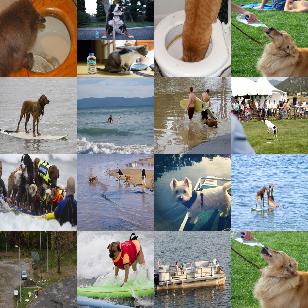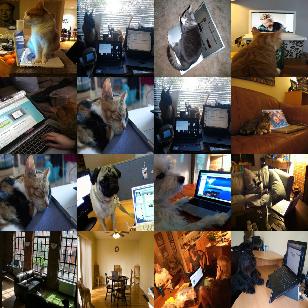MetaShift¶
MetaShift can be described as a dataset of dataset. It divides the original Visual Genome dataset into classes and contexts in order to capture distribution shifts. See paper : https://arxiv.org/abs/2202.06523
In continuum, we use the context information to build various types of scenarios, notably domain incremental scenario.
The user can select a subset of classes to include in the scenario with class_names argument and if all class should appear in all tasks with strict_domain_inc argument.
Images can be associated with several context, then the user can decide if one image appear only once or can appear several time. If the image should appear only once, then the context chosen will be selected randomly.
Visual Genome:¶
To download the Visual Genome dataset in advance :
wget -c https://nlp.stanford.edu/data/gqa/images.zip
unzip images.zip -d MetaShift
Use the visual_genome_path argument in MetaShift constructor if you already have the original Visual Genome dataset downloaded.
Provide it with the path to the folder containing all Visual Genome images.
from continuum.datasets import MetaShift
data = MetaShift(datafolder, visual_genome_path = "some/path/images")
ContinualScenario:¶
Beware that the default configuration will download the full Visual Genome dataset if it is not already present in a folder named “MetaShift” (20GB).
Tasks are defined by the context in which the objects appear. In the following example, dogs and cats with water on the right and with computers on the left.


Default scenario settings:
from continuum.datasets import MetaShift
from continuum.scenarios import ContinualScenario
data = MetaShift(datafolder)
scenario = ContinualScenario(data)
Specific classes:
Select specific classes to appear in the dataset with the argument class_names.
Then specify if all classes should apprear in all tasks with the argument strict_domain_inc. If True, only contexts found in all specified classes will be kept.
from continuum.datasets import MetaShift
from continuum.scenarios import ContinualScenario
from continuum.datasets.metashift import get_all_classes_contexts
all_classes, all_contexts = get_all_classes_contexts(datafolder)
# Use this function to retrieve all metashift classes and contexts.
data = MetaShift(datafolder, class_names = ["cat", "dog"], strict_domain_inc = True)
scenario = ContinualScenario(data) # 81 tasks will be generated.
Specific contexts:
Select specific contexts with the argument context_names.
from continuum.datasets import MetaShift
from continuum.scenarios import ContinualScenario
from continuum.datasets.metashift import get_all_contexts_from_classes
contexts = get_all_contexts_from_classes(datafolder, ["cat", "dog", "horse"])
# Use this function to retreive all metashift contexts for given classes.
data = MetaShift(datafolder, context_names=["water", "ocean"])
scenario = ContinualScenario(data)
Get a unique task for each image:
Tasks can appear in multiple combinations of classes and contexts.
By setting unique_occurence=True, the task in which each image appears will be chosen randomly.
from continuum.datasets import MetaShift
from continuum.scenarios import ContinualScenario
data = MetaShift(datafolder, unique_occurence=True, random_seed=42)
scenario = ContinualScenario(data)